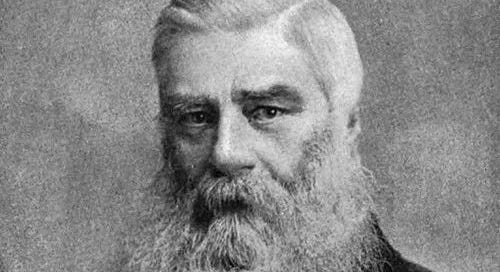George Alfred Henty (1832-1902) worked for several British publications throughout the mid to late 1800’s as a foreign war correspondent. Prior to this he had spent time serving as a soldier during the Crimean War. Over the course of his experiences he saw many different battle fronts and endured situations which few of us are able to comprehend. From nearly freezing to death, to suffering from stifling stagnant heat in jungles, to trying not to be washed away by flash floods, Henty had experienced it. From almost being prosecuted as a spy in Italy to spending never-ending nights in tents while being bitten by relentless swarms of ants, mosquitos, and other pests (all because it was a better option than sleeping outside and breathing in toxic marsh fumes), Henty knew what it meant to face difficult challenges and keep your wits about you.
Henty was also a devoted Christian. He was very concerned to see young men grow up to be virtuous “lads” (as he would typically call them in his letters to boys which always preceded his novels) who would honor their parents, serve their country, and do the right thing even when it was incredibly hard to do so. In pursuit of helping young men learn what it means to be courageous, honest, wise, temperate, and many other such traits, Henty combined his real world understanding of facing impossible difficulties with his own great love of history. Henty wrote 99 full-size historical fiction and adventure novels. The historical settings spanned from ancient Egypt to events occurring in Henty’s own life.
Henty does a masterful job of weaving compelling and exciting narratives which set ablaze the imagination into the midst of real historical events. Reading his works will do much toward gaining an understanding of real historical settings, conflicts, and people while keeping you on the edge of your seat wanting to know what happened next. True, Henty uses “a lot of description” (as some are wont to complain) but this is because his books aren’t Goosebumbs or Captain Underpants. They are something altogether higher in quality than those kinds of inane stories. Henty is teaching us truth even while writing fiction. He is teaching us to be courageous, just, and prudent when there is (as yet in our seats reading his books) nothing which calls us to exercise those virtues right this moment. What better time to learn virtue than before virtue is required of us?
If you don’t want to awaken the moral imagination of your young men then you should definitely keep them away from G. A. Henty. If you don’t want your boys thinking it might be good and right to protect young ladies from vile and wicked men then you should definitely keep them away from G. A. Henty. If you don’t want your own lads to grow in independence, with a sense of adventure, believing that the evil in this world is conquerable by the just actions of dangerous (but good) men…then G. A. Henty should be kept far, far away from your boys. On every page Henty calls for boys to become men and not defeatist snowflakes with an identity crisis.
The Young Carthaginian is just one of the 99 novels he wrote and it begins shortly before the second of the three Punic Wars (264-146 B.C.). The story follows a young man from Carthage, named Malchus, who learns from his father how to be a soldier in the midst of the intensifying conflict between his own country and Rome. Malchus comes to be of good service to his cousin who rises to be one of the greatest military leaders in world history, Hannibal.
So mighty and clever was Hannibal that it became a common place in Roman homes for mothers to warn their naughty children “Hannibal ad portas!” or “Hannibal is at the gates!” In other words, keep it up and you’re headed for destruction! Hannibal’s unusual battle tactics and willingness to take extreme measures presented Rome with its most formidable challenge as it sought to gain total supremacy in the Mediterranean world. Imagine the Roman’s surprise when for the first time they marched rank by rank toward the Carthaginian host just to be charged suddenly by a herd of elephants!
This is the tale, part history, part fiction, of Hannibal’s rise to power as the tremendous figure which the world has come to know. All seen through the eyes of a young man learning what it means to be honorable, courageous, and good. You can pick up a copy of this story HERE and dive in!
This post is the landing page for the study Guide of G. A. Henty’s The Young Carthaginian. Below you will find links, as they become available, to discussion questions on each chapter of this book. Please feel free to use them for your own private enjoyment and reflection or in your classroom or homeschool. To see the growing list of completed Study Guides you can click HERE.
Chapter One: The Camp in the Desert
Chapter Four: A Popular Rising
Chapter Six: A Campaign in Spain
Chapter Eight: A Plot Frustrated
Chapter Nine: The Siege of Saguntum
Chapter Eleven: The Passage of the Rhône
Chapter Twelve: Among the Passes
Chapter Thirteen: The Battle of the Trebia
Chapter Fourteen: The Battle of Lake Trasimene
Chapter Fifteen: A Mountain Tribe
Chapter Sixteen: In The Dungeons of Carthage
Chapter Nineteen: In the Mines
Chapter Twenty: The Sardinian Forests
Chapter Twenty-One: The Gaulish Slave
A PDF version of this study with lots of extras is available to Paid Subscribers!




Thank you for drawing my attention to this author! I just found the free plain text version of the book on project Gutenberg:
https://www.gutenberg.org/files/5128/5128-0.txt
as well as a free librivox audio recording:
https://archive.org/details/the_young_carthaginian_1402_librivox
Looking forward to getting into it with my sons:)
How have I never heard of Henty?! Thank you.